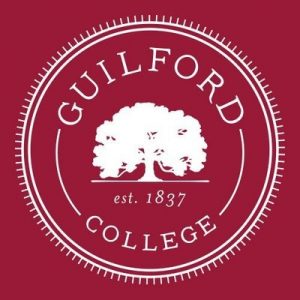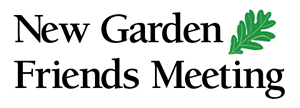 The letter below regarding Guilford College was sent by the Friends Association for Higher Education (FAHE) to the Board of Trustees Chair, Interim President and Clerk of the Faculty. It is shared in the spirit of informing New Gardeners about the situation at Guilford College. Also, there has been a recent surge in COVID cases on campus. Friends are encouraged to hold Guilford in the Light as they make difficult decisions about the future and manage the current health needs, and to reach out to anyone there to offer support.
The letter below regarding Guilford College was sent by the Friends Association for Higher Education (FAHE) to the Board of Trustees Chair, Interim President and Clerk of the Faculty. It is shared in the spirit of informing New Gardeners about the situation at Guilford College. Also, there has been a recent surge in COVID cases on campus. Friends are encouraged to hold Guilford in the Light as they make difficult decisions about the future and manage the current health needs, and to reach out to anyone there to offer support.
Letter of Tender Concern to Guilford College 11/23/20
To: Carol Moore, President, Maria Rosales, Clerk of the Faculty, Edward C. Winslow III, Board of Trustees Chair,
On behalf of the Friends Association for Higher Education, charged with overseeing FAHE’s mission and leadings, we write to express our love and concern for the many challenges facing our member institutions at this time, and especially for you at Guilford. Every path forward seemingly imposes costs that would have been seen as appallingly unthinkable before the impacts of the Covid-19 pandemic, although those impacts reflect changing perceptions of higher education, demographic shifts, and evolving information technologies.
We write having ourselves participated in painful conversations over steps needed to maintain the viability of our beloved association. But those conversations have also led to an expansion of opportunities for engagement and community building by our members and a renewal of our sense of mission. That mission includes “assisting Friends Colleges in their efforts to affirm their Quaker heritage” and in clarifying and articulating “the distinctively Quaker vision of higher education, in terms of both curriculum and teaching.”
We stand ready to offer what assistance we can as you navigate the challenging decisions facing the Guilford community. We grieve and unite with the faculty and staff (experiencing or fearing the loss of livelihood and valued careers), students (uncertain over the viability of curricular plans), alumni (trying to make sense from afar of the evolving discernment process on campus) and members of the Board and senior leadership team (facing the challenge of enrollment uncertainty, diminishing revenue and rising costs for an unpredictable future). We know that in this time of unprecedented challenges all at historically Quaker colleges struggle with the query: what does it mean to remain faithful to our history and mission at a time when marketing consultants press us to offer only “best-selling” fields of study that produce students narrowly focused on their own economic success? We are ill suited and frankly unlikely to succeed in imitating other colleges and universities that choose this path.
We appreciate that desperate times call for desperate measures, but desperate measures do not have to require making changes that cut into the souls of our institutions. Why not instead be bold in a different direction, unapologetically affirming a truly distinctive vision of education? The world needs students who have the tools to address the many complex problems the world faces; the distinctive education grounded in our shared Quaker heritage is uniquely suited for this challenge.
While most of FAHE’s institutional members, like Guilford, are independent of formal ownership by any Quaker body, all trace elements of their identity to the testimonies of the Religious Society of Friends that emerge from the recognition and celebration of the divine core in all of us. Guilford has been particularly successful, despite the relatively few Friends among faculty and students, at incorporating those testimonies into the educational experience in a way that distinguishes Guilford from other liberal arts colleges. Having this distinctive vision of higher education might actually be a market strength instead of a liability.
Not only is it strategic for a college to be distinctive, the world urgently needs what Quaker colleges have to offer: the kind of education that prepares students not only for their own personal economic success but also prepares them to make a positive difference in the world. Preparing students to make a positive difference requires helping them to develop a thorough understanding of both the natural and the human world, not only understanding the world as it is, but being able to envision what it could be in order to work to bring this vision into being. And there are students who are looking for exactly this kind of education. Where would they go if there were no longer any colleges offering such an approach?
It is not our place to intrude on Guilford’s process of discerning how to remain true to mission in addressing these times of crisis .But at the heart of the Quaker testimonies on which the College was founded is faith in corporate discernment emerging from a gathered people answering that of God, that spark of Truth in each individual. Trust that process.
We offer these queries for your consideration as you consider the path forward:
- Are there alternative proposals for institutional changes that would prepare students to live lives of meaning while providing sufficient cost reductions and revenue increases?
- How do proposed long term institutional strategies align with your mission?
- Are proposed changes consistent with the norms of and commitments made to the larger communities of which Guilford is a part [including the Religious Society of Friends, the Southern Association of Colleges and Schools Commission, the American Association of University Professors]?
- Are you faithful to traditional practices of discernment that have served Guilford well in the past?
- How can you create a space in the midst of crisis for creative, bold and transformative thinking?
- How can you repair the sense of community damaged by good-faith but painful unilateral responses to crisis?
FAHE would be eager to engage with you in the process of discernment as you reflect on your vision. We believe strongly that embracing what has always been distinctive about the missions of our institutions will allow us not only to survive the current challenges to higher education, but to flourish.
On behalf of the FAHE Executive Committee, Stephen Potthoff, Professor Donn Weinholtz, Professor Professor Emeritus, Wilmington College University of Hartford, FAHE Co-clerk FAHE Co-clerk

